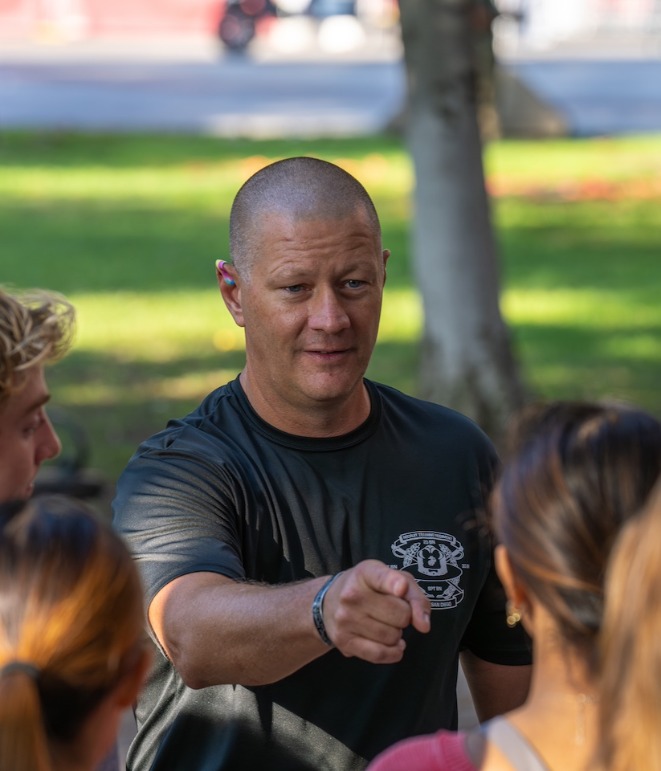“You are all leaders. You just have to find it within yourself” was the closing affirmation Sergeant Major John Miller MBV ’25 gave to 80 first-year students after they completed a number of team-building exercises.
This is the sixth time that members from the Master of Business for Veterans (MBV) cohort have collaborated with undergraduates within the Global Leadership Program (GLP).
For three hours, the students worked in small groups as they maneuvered a leadership reactionary course — simple games and exercises requiring the students to listen, support, and engage each other to accomplish shared goals. Joining Miller as guides were three of his fellow MBV cohort members and a few drill instructors from his unit in San Diego.
Developing leaders happens to be Miller’s specialty. While studying for his master’s degree at USC, Miller remains on active duty at the United States Marine Corps Recruit Training Regiment and oversees the basic training school that develops 22,000 recruits into Marines each year. A skilled communicator and instructor with numerous overseas deployments under his belt, Miller was a natural choice to organize the annual MBV/GLP class showcasing how to transfer strategy skills from the military to business acumen and leadership roles.
“Among the attributes that MBV students bring to Marshall is leadership experience in an organization which puts more emphasis on leadership development than any other in the country,” said James Bogle, program director, Master of Business for Veterans. “To be able to share some of the lessons from their military careers with freshman honor students means a lot to MBV students. It is their chance to contribute in service back to Marshall.”
Tyrone Callahan, a professor of clinical finance and business economics and a faculty co-lead of GLP, regards the collaboration as a huge benefit for the undergraduates. By connecting and learning from their graduate colleagues, the first-year students can see a clear path toward their career aspirations.
“We always look for opportunities where the undergrads and grads could do more together. A lot of that hasn’t come to fruition, but there are many dimensions within the MBV/GLP connection that makes this successful every year it happens,” Callahan explained.
Callahan notes the first-years can draw out the right kind of lessons that apply in almost every setting.
“We’re trying to give these students different leadership models to try on and see what fits and what doesn’t fit,” Callahan continued. “The military is a uniquely challenging leadership context and very complementary to what we teach in terms of leadership frameworks.”
Flexibility isn’t only a skill for the students, but an aspect of the entire program. Over the years of co-leading GLP, Julia Plotts, professor of clinical finance and business economics, says the program’s structure has adjusted to meet the changing needs of the students from a corporate approach to engaging diverse interests.

